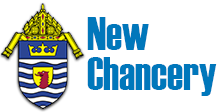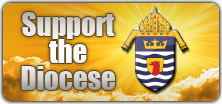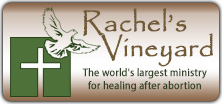Bishop Glen John Provost, D.D., M.A
Bishop of Lake Charles
Priesthood Ordination
Saturday, June 29, 2019
Cathedral of the Immaculate Conception
Lake Charles, Louisiana
"Who do people say that the Son of Man is?” Matthew 16:13
A seminarian once wrote me on the eve of ordination. He wanted advice for “a young deacon preparing to depart” his four years of seminary. The question gave me pause to reflect on my own experiences, the things I did and the things I had failed to do. One of my recommendations was to visit one last time with the priest, perhaps the spiritual director or the theology professor, who had opened for him some low door in the wall. In that farewell visit, I suggested he should do two things. First, ask for some final words of wisdom, and second, say “thank you”—thank him for all he did, thank him for his guidance and patience, thank God for his existence. We don’t say “thank you” enough, especially in this ungrateful world. However, when someone has given of himself to help us reach a better understanding of our Lord and ourselves, then an expression of gratitude is the least we can do. These moments of gratitude and recognition are turning points in our lives.
I think we encounter one such moment in the Gospel assigned for this Solemnity of St. Peter and St. Paul. The disciples have reached a pivotal moment with our Lord. He must ask them, “Who do people say that the Son of Man is?” (Matthew 16:13). He poses this question not for His own sake but for them. Everything He has done and will do is for them and for us.
The disciples give our Lord an honest answer. Some will say He is the self-deprecating John the Baptist, or perhaps the mighty Elijah or the chastising Jeremiah. By means of a Socratic-style dialogue, Our Lord has thus established the dialectic. There are those who do not know and there are those who should know.
So our Lord asks them, “But who do you say that I am?” (Matthew 16:15). Here we have reached the heart of the matter. Anyone who claims to be a disciple must know who the master and the teacher is. We have come to the “low door in the wall,” to continue my analogy, and it must be opened. Who will do this for us? St. Peter, of course.
“You are the Messiah, the Son of the living God” (Matthew 16:16). There you have it, plain and simple. You see, gentlemen, 2 plus 2 does not equal 5. Some may want it to equal 5 but that doesn’t make it 5. If 2 plus 2 can equal 5, then why not 6. That’s the point. There is either an accurate answer or there is not. In the case of our Lord there is no virtual reality. Our Lord does in fact know who He is. His question is not some adolescent rumination on personal identity or some youthful musing in self-discovery. He knows everything, about Himself, about the Father’s Will, about the disciples, about us, about you.
The purpose of our Lord’s question and answer with His disciples is to elicit faith in Him. “Who do you say that I am?” This is the question a good spiritual director would ask us. “Who do you say that the Lord is?” Until there is this unequivocal profession of faith, then there is no progress. “You are the Messiah, the Son of the living God” is a firm espousal of the basic premise of Christianity itself. This was the governing principle that formed the very thought of the best theology professors you had. “You are the Messiah, the Son of the living God” is what moves the heart and mind to assent.
And with every assent, act of belief, and profession of faith there follows a mission. Something is expected of us. St. Peter is a rock on which the Church will be built (Matthew 16:18). To him will be entrusted “the keys to the kingdom of heaven,” simultaneously binding and loosing on earth and in heaven (Matthew 16:19). What is required of you?
You have come to the altar of God—in this newly restored Cathedral—to express a belief. This is no small matter. You are not telling us that the priesthood of Jesus Christ is so much something you want. You are testifying that you believe this is what our Lord wants, that you have a deep enough relationship with Him, that for the remainder of your life you will profess with St. Peter, “You are the Messiah, the Son of the living God,” that this assent will move you to preach the Gospel tirelessly, serve the People of God selflessly, and allow our Lord to form you as He would have you, not as you would have yourself. This is the way of the Cross.
Do you remember how this chapter in the Gospel of St. Matthew ends? Immediately following St. Peter’s profession and commissioning, our Lord predicts His Passion. He must suffer and die, something with which St. Peter takes exception. Even St. Peter needs a little more spiritual direction, and our Lord gives it to him. Our Lord ends this chapter with this admonition: “Whoever wishes to come after me must deny himself, take up his cross, and follow me” (Matthew 16:24).
If the priest is an alter Christus, then he walks the way of the Cross. When he goes to the altar of God to offer the bloodless sacrifice of the Cross, then he journeys to Calvary with the mind of Christ. He makes his way with the mind of obedience, humility, and love. In this chemin de la croix, nothing less is required of the priest than an identification with the sacrifice of love that redeemed the world. The only disposition important to the priest is the mind of Christ. I cannot emphasize this point strongly enough.
This last Lent I issued a Pastoral Letter on prayer. In it I drew attention to Father Adolphe Tanquerey’s classic work, The Spiritual Life. He speaks about what should be on the mind of the priest when approaching the altar of God to offer Holy Mass. “The fundamental and all-inclusive disposition,” he writes, “is that of humble and trusting union with the disposition manifested by Christ on the Cross and renewed now on the Altar” (second edition, Desclée, p. 141).
This identification of the priest with the person of Christ is what motivated St. Jean Marie Vianney to reflect in his Catechism on the selfless priest. He wrote:
The priest is not a priest for himself; he does not give himself
absolution; he does not administer the Sacraments to himself;
He is not for himself; he is for you.
The identity of the priest comes first from knowing who Christ is. “You are the Messiah, the Son of the living God.” Then, that faith informs the priest about what he must do—deny himself, take up his cross and follow. “The priest is not a priest for himself.” Neither was Christ for Himself. Neither should we be for ourselves.
May God fashion our priestly disposition to that of Christ on the road to Calvary. May the example of St. Peter on the cross and St. Paul before the sword inspire us to identify with Christ completely. We ask this through Christ our Lord. Amen.
















